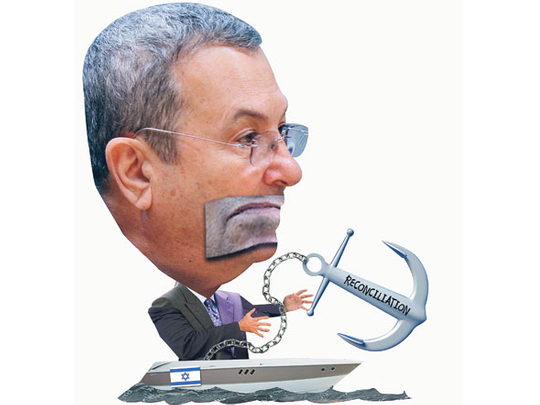
Israeli Defence Minister Ehud Barak landed in Turkey on Sunday hoping to repair bilateral relations damaged by his colleague, Foreign Minister Avigdor Liebermann.
The foreign minister's deputy, Danny Ayalon, sparked a diplomatic row last week by offending the Turkish Ambassador to Tel Aviv a blatant attempt to sabotage Turkish-Israeli relations, which have been in a downward spiral since the Gaza War in 2008-2009. Prime Minister Benjamin Netanyahu caved into Turkey's ultimatum, which threatened to withdraw its ambassador unless an apology was forthcoming, but was clearly unimpressed and relatively ambivalent about saving his country's relations with Ankara. He is furious with the Turks for taking sides against him and the policies of his foreign minister.
Supporting Barak in trying to salvage Turkish-Israeli relations is the ageing President Shimon Peres, who, realising Turkey's worth, had signed a military cooperation agreement with it in February 1996, when he was prime minister.
Lieberman and Netanyahu are angry with the Turks for a variety of reasons that go way beyond Prime Minister Recep Tayyip Erdogan's harsh words against the Israeli president at the World Economic Forum in January 2009, or the cancelling of joint military drills last October. They are infuriated with the Turks for supporting Hamas and Hezbollah, for forging a new alliance with the Syrians, and for supporting calls for a freeze on all colonies and a lift of the siege on Gaza, before any peace talks are resumed with the Palestinians. In short, they are furious with Erdogan's Turkey, once regarded as Israel's strongest and only Muslim ally.
Neo-Ottomanism
Lieberman understands only too well what it means for Erdogan to re-establish Turkish influence, politically, economically, culturally and socially, on territories that were once part of the Ottoman Empire. The foreign minister, a former soldier in the Israel Defence Forces, holds a BA in political science from Hebrew University and, surely, is well read in contemporary Middle East history. The Ottoman Sultan Abdul Hamid II famously refused to even meet the Jewish banker Mizray Qrasow when, in 1901, he offered to pay off the empire's debts and build it a navy in exchange for the right to build colonies and buy Arab land in Palestine. Abdul Hamid told one of his aides, "Tell those impolite Jews that I am not going to carry the historical shame for selling holy land to the Jews and betraying the responsibility and trust of my people."
Erdogan feels a deep commitment towards Palestine stemming from Turkish history and realises that by defending the Palestinians, Lebanese, or Syrians, against Israeli aggression he is actually defending Turkey too. Days before the diplomatic crisis snowballed between Turkey and Israel, Erdogan had received Lebanese Prime Minister Sa'ad Hariri in Ankara. The two men defended the right of Hezbollah which is strongly represented in Hariri's Cabinet to bear arms in their struggle against Israel. During his press conference with Hariri, Erdogan reminded the world that "no less than 100 resolutions" have been defied by Israel, calling for a serious revamp of the United Nations, in which both his country and Lebanon are now serving on rotating seats in the Security Council. Turkey's heavyweight influence at the UN will come in handy as Lebanon tries to declare that UN Security Council Resolution 1559, which calls for the disarmament of all militias, has been "fully implemented." Hezbollah, now a Hariri ally, is being regarded as part of the Lebanese defence system, and its arms are "protected and embraced" by the Hariri Cabinet. Therefore, both Lebanon and Turkey claim that it cannot be considered a militia.
Lieberman and Netanyahu are itching for a new round of violence with Hezbollah, to settle old scores. Turkey's determination to spare Lebanon another war next summer is shared by Saudi Arabia, which wants Hariri to succeed as prime minister. After Hariri's December 2009 visit to Damascus, Hezbollah chief Hassan Nasrallah will be heading to Riyadh, in signs of newfound cooperation between Damascus, Beirut, Riyadh and Ankara—four heavyweight cities in the former Ottoman Empire. All of this fits in nicely with Erdogan's efforts at mediating between Fatah and Hamas, trying to find common ground between Damascus and Baghdad, and settling internal divisions in Iraq. Additionally, last week Turkey lifted visa requirements with Lebanon, making the latter the sixth Arab state to open its borders to Turkey, after Syria, Jordan, Morocco, Tunisia and Libya.
On the Israeli side, Barak alone seems determined to push for reconciliation. In Ankara, however, he was not received by Erdogan or President Abdullah Gul, causing him to remark, "We are allies, strategic allies, as long as our interests forces us to be so." The word "forces" speaks volumes about how low relations have sunk, and how decision-makers in the upper-echelons of power in Tel Aviv are reacting to what many are now calling, "neo-Ottomanism".
Sami Moubayed is editor-in-chief of Forward Magazine.









